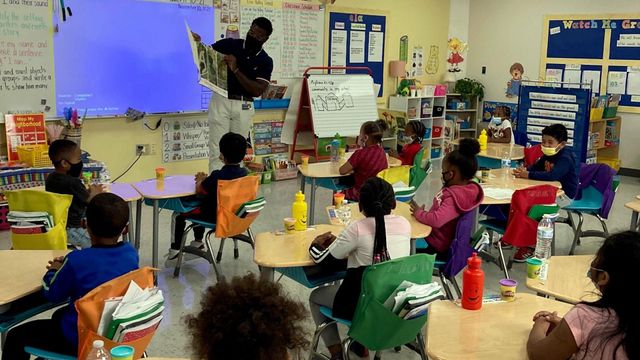NCCU program aims to get more Black men into teaching
Although more than one-third of public school students nationwide are Black, less than 2 percent of teachers are Black men. North Carolina Central University wants to close that numbers gap.
To create a pipeline of Black educators for classrooms in North Carolina and beyond, N.C. Central's School of Education has launched the Marathon Teaching Institute.
"In the early 1900s, teaching was a prime career," MTI program director Quintin Murphy said. "As more degrees, such as science and engineering and the arts, started to take rise, teaching kind of fell in the backseat."
WRAL Investigates examined the diversity gap among teachers almost three years ago and found that 11 North Carolina school districts had no Latino teachers in the 2017-18 school year and eight had no Black teachers. One district had no teachers of color at all.
Currently, Durham Public Schools has 277 Black men teaching, or 11 percent of all of its teachers. In Cumberland County Schools, the 283 Black men teaching make up only 7 percent of the district total. But less than 3 percent of Wake County Public School System's teachers are Black men – 316.
The numbers are even more striking when compared with the numbers of Black male students in each district. Durham schools have nearly twice as many Black males in classrooms as teaching them. In Cumberland County, the rate is more than triple the number of Black male students, and it's nearly four times as many in Wake County.
"If you want to kind of tackle graduation rates among African American men, then you must be able – we must be able to see themselves in front of the classroom. That’s what this program is all about," said Murphy, who's also the chief recruiter for the School of Education. "There are some things that an African American teacher can teach and go through, not only in the classroom but also life experiences that they can relate to any young person in the classroom."
MTI recruits Black men enrolled in N.C. Central's teaching program – four started in August, and five more will join next semester – and provides mentoring through a network of alumni and professional development, along with classes on entrepreneurship and financial literacy.
"When we put together this program, we didn’t want it to be just another book club or another just program," Murphy said. "We [want them] learning not only about things in the classroom but also about how to be a well-rounded man outside these walls once they graduate."
The program also offers students scholarships and has partnered with Durham Public Schools to get participants into local classrooms as quickly as possible for more hands-on training.
Student Miles Turmon, who has been teaching at Eno Valley Elementary School, said he loves being in front of the classroom.
"I’m able to pour into these children," he said. "I’m able to pour in more than just curriculum; I’m able to pour life into them."
Turmon said he didn't have a Black man as a teacher from elementary through high school, and he doesn't want other children to miss out on seeing a teacher who looks like them.
"To be able to see that, they’ll be able to grasp that they’ll be able to do that and [that] they can do anything that they want to," he said. "I just want to be able to be that pillar, like I said, for the children in our community who don’t have that male role model, which is a lot."
As MTI grows, Murphy said, he hopes N.C. Central can replicate the program at other historically Black colleges and universities nationwide.
"My hope is that this is just a small tidbit of what’s to come," he said.
"We’re just going have to make that change," Turmon said. "We’re going to have to go out there, we’re going to have to be pillars, and I believe it starts with me."













